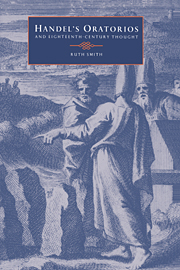Book contents
- Front Matter
- Contents
- Acknowledgements
- Abbreviations
- Introduction
- PART 1 ENGLISH ORIGINS OF ENGLISH ORATORIO
- PART II THE PATRIOT LIBRETTO FROM THE EXCISE BILL TO THE JEW BILL: ISRAELITE ORATORIOS AND ENGLISH POLITICS
- Chapter 8 Political events and political thought
- Chapter 9 Allegorical politics
- Chapter 10 Moral politics
- Chapter 11 ‘Esther’ to ‘Athalia’
- Chapter 12 In time of war
- Chapter 13 Images of government
- Chapter 14 The conflict of public and private interests
- Chapter 15 Coda: the end of Handel's Israelite oratorios
- Appendix I Libretto authors and sources
- Appendix 2 The oratorios and Methodism
- Notes
- Bibliography of sources cited
- Index
Chapter 9 - Allegorical politics
Published online by Cambridge University Press: 22 September 2009
- Front Matter
- Contents
- Acknowledgements
- Abbreviations
- Introduction
- PART 1 ENGLISH ORIGINS OF ENGLISH ORATORIO
- PART II THE PATRIOT LIBRETTO FROM THE EXCISE BILL TO THE JEW BILL: ISRAELITE ORATORIOS AND ENGLISH POLITICS
- Chapter 8 Political events and political thought
- Chapter 9 Allegorical politics
- Chapter 10 Moral politics
- Chapter 11 ‘Esther’ to ‘Athalia’
- Chapter 12 In time of war
- Chapter 13 Images of government
- Chapter 14 The conflict of public and private interests
- Chapter 15 Coda: the end of Handel's Israelite oratorios
- Appendix I Libretto authors and sources
- Appendix 2 The oratorios and Methodism
- Notes
- Bibliography of sources cited
- Index
Summary
Besides being often didactic, the politically imbued verse, drama and music theatre of the first half of the eighteenth century is often allusive and cryptic. Many of its ‘lessons’ were so familiar to readers that only a phrase was needed to bring whole ideologies to mind. This makes comprehension a challenging business for the twentieth-century reader. Understanding – even noticing – the coded references needs the basic equipment of acquaintance with not only the topics which interested eighteenth-century writers and readers, but their methods of referring to them. Without such knowledge we see these works, which include the oratorio librettos, through a fog, and are in danger of thinking there is nothing there. This chapter offers some signposts to the allusive practices of three areas occupied by oratorio: the theatre, the interpretation of Scripture, and the writing of history. But it begins with political journalism, and the verbal involvement of Handel and his music in day-to-day political life.
MUSIC AS POLITICAL METAPHOR
The previous chapter noted the importance of music theatre as a vehicle for political messages. Music and musicians also served as a prime analogy for the state and statesmen. This had a direct impact on the history of oratorio. On 7 April 1733, at the height of the Excise crisis, the Craftsman devoted a whole issue to attacking Walpole through a lampoon of Handel.
- Type
- Chapter
- Information
- Handel's Oratorios and Eighteenth-Century Thought , pp. 202 - 232Publisher: Cambridge University PressPrint publication year: 1995

